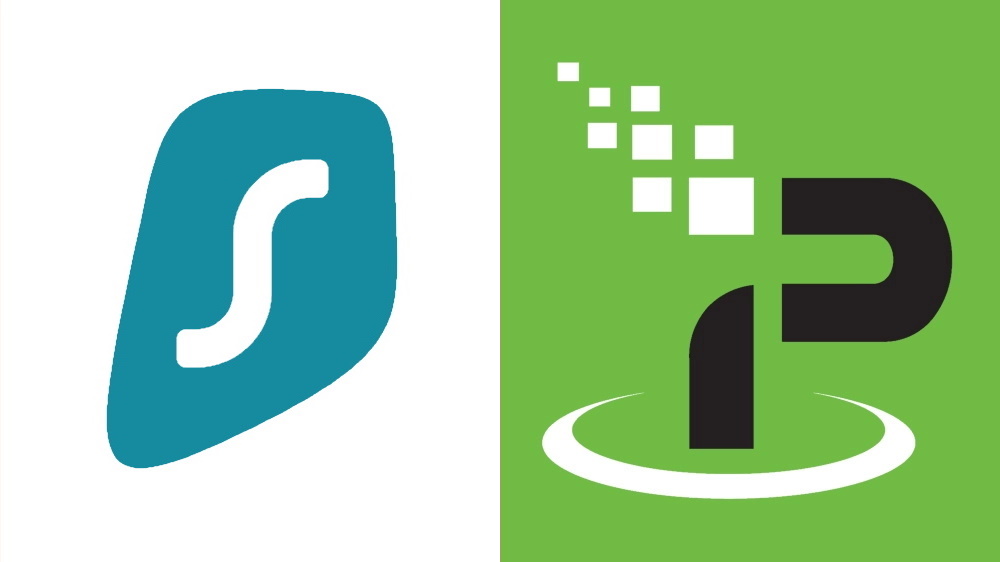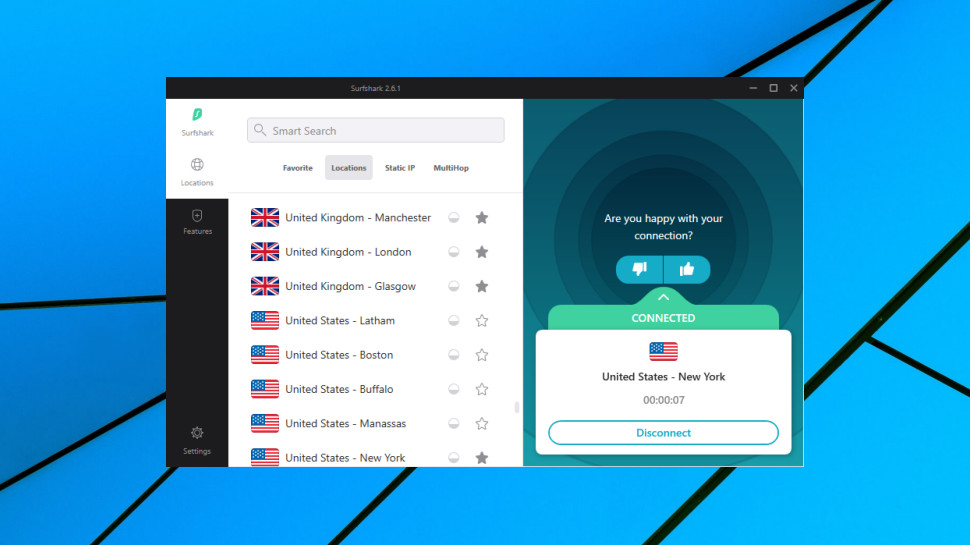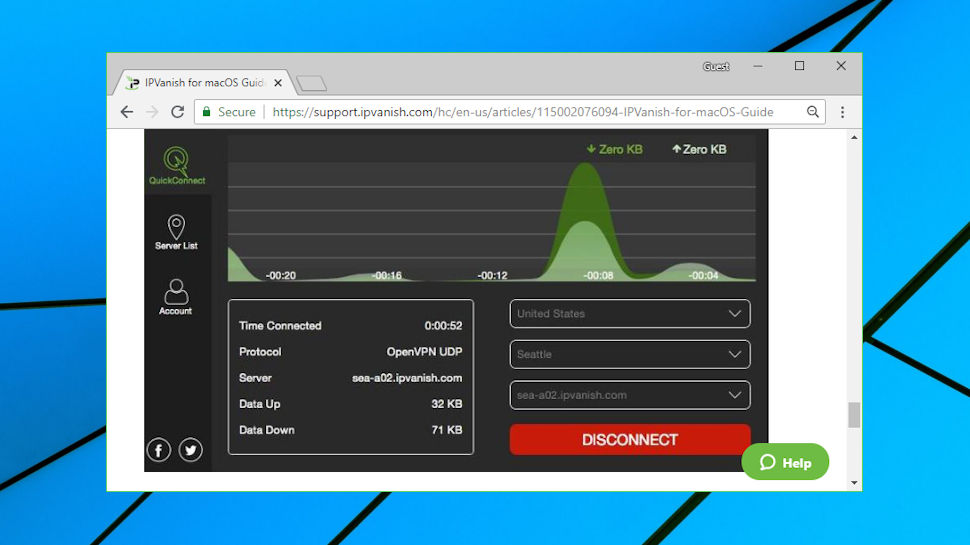Surfshark vs IPVanish: which VPN should you get?
Two of the best VPNs vie for your custom

Once you’ve decided to get a VPN it can be difficult picking which is the right one for you – there’s such a diverse selection of great-quality options, and choosing between them depends on what you’re planning on using a VPN for.
That’s why we’re comparing the best VPNs head-to-head in a variety of different areas. This time, it’s IPVanish vs Surfshark.
US-based and well-known, IPVanish has been a big name in the VPN world for a long time. With tons of features and awesome configurability it’s certainly earnt its place, and a partnership with secure cloud storage firm SugarSync gives its plans real added value.
However, Surfshark is a swift swimmer, and is making a name for itself as one of the names to beat – great prices, excellent speeds and a simple interface make it a tempting proposition.
So, which one should you pick? Read on to find out…
- TechRadar's Surfshark review
- TechRadar's IPVanish review
Surfshark vs IPVanish: First impressions and specs
Number of servers:
Surfshark: 1,700+ / IPVanish: 1,400+
Server countries:
Surfshark: 60+ / IPVanish: 75+
Maximum simultaneous connections:
Surfshark: Unlimited / IPVanish: 10
Money back guarantee:
Surfshark: 30 days / IPVanish: 30 days
Lowest monthly cost:
Surfshark: $1.99 / IPVanish: $5.20
IPVanish and Surfshark both install easily and deliver powerful desktop clients that do exactly what you want them to do.
Surfshark opens with a simple and pretty grey and teal interface, displaying your recently used servers, a complete list to the left and nice big connect button to get you started immediately.
IPVanish is decidedly less simple – you’re presented with tons of info, including your time connected, protocol, data up and down, IP address, a live speed graph and plenty more. Although perhaps overkill, all of this is useful, and we appreciate being able to see it.
In terms of specs, there’s not much between the two – Surfshark’s unlimited connection policy is unbeatable, although IPVanish’s generous offer of 10 will likely suffice for the vast majority of users. Otherwise, they’re neck and neck.
So, are these VPNs as similar in practice as they are on paper?
Plans, pricing and trials
If you only fancy signing up for one month, you’ll be paying top dollar for either service – Surfshark’s one-month plan is $11.95, and IPVanish’s isn’t much cheaper at $10.
However, things get a little more affordable if you sign up for longer. IPVanish’s next offering is a three-month plan for $8.99 a month. Surfshark doesn’t bother with these middling plans and jumps straight to a one-year contract – which drops the price to $5.99 a month.
To get the most from your money, it’s worth going for the longest plan available. IPVanish offers a year-long plan for $5.20, which saves you over 50% compared to the single-month plan. However, the star of the show is Surfshark’s two-year plan, which undercuts every one of its direct competitors at a staggering $1.99 a month.
Due to its incredible value, Surfshark takes this round by storm – you’ll pay less for two years of Surfshark than for just one of IPVanish. However, IPVanish’s free SugarSync cloud storage – which is more expensive alone than with this bundled plan – could make that extra outlay worth it.
Surfshark vs IPVanish: Privacy
IPVanish has an excellent suite of privacy-focused features, including a choice of protocols, a kill switch, plus DNS and IPv6 leak protection.
Surfshark also provides great privacy for its users, with a selection of protocols, a kill switch, its own private DNS on every server and the ability to multi-hop – meaning you can route your traffic through two different servers, further anonymizing your location.
However, an interesting feature IPVanish provides is ‘Scramble’, which obscures the fact you’re using a VPN at all – perfect if you’re using your VPN in China or similar country that has severe restrictions on internet usage.
Overall, Surfshark and IPVanish are pretty even here, though if you’re in a position to use it, IPVanish’s Scramble is feature worth paying for.
Surfshark vs IPVanish: Logging
Both IPVanish and Surfshark claim not to hold any logs of users’ personal details.
The only data Surfshark collects is the customer’s email address and billing information – IP address, which servers you use, bandwidth used, browsing history and connection timestamps all stay entirely unrecorded. IPVanish also only collects emails and payment info, with app usage left alone.
In essence, this means that nothing that could identify you or your activity is recorded – even if someone wanted it, there’s nothing there to divulge.
However, neither provider has undergone any sort of rigorous external audit, so while we don’t necessarily doubt their claims, we can’t be sure of their absolute authenticity either.

Surfshark vs IPVanish: Performance
The big one – how fast are these VPNs?
All the security in the world is no good if you can’t actually get online, so the performance of a VPN is critical.
In our full review, Surfshark proved to be seriously quick – on our 75Mb test line it averaged around 68Mb. When tested on a 110Mb UK line for this head-to-head, it delivered great speeds again, averaging around 103Mb.
IPVanish was less impressive in its full review, although its inconsistent performance did correlate with the start of lockdown and a high strain on its servers. In tests for this comparison the VPN performed much better, delivering reliable speeds just below 100Mb on the same 110Mb line.
Although IPVanish is marginally slower in the UK, the US-based provider delivers better speeds in the States – in our full review we reported an average of 220Mb on a 600Mb line, compared to Surfshark’s 150Mb.
For those in the UK, Surfshark is quicker – although not by much. In the US, IPVanish knocks it out the park.
Surfshark vs IPVanish: Streaming
One of the most important features of any VPN today is the ability to access blocked streaming media. Surfshark’s site is bold about its unblocking capabilities, naming the 14 Netflix locations it can access. In our full review we tested these claims, and it delivered by unblocking YouTube and all the Netflix servers we tried.
IPVanish is a little more cagey about this aspect of its service, but it still delivered by unblocking YouTube and Netflix.
However, iPlayer is the hardest nut to crack – of the two, only Surfshark was able to give us access to the BBC’s streaming service.
If you’re in the UK or not bothered about iPlayer, both providers will be useful and feature on our best Netflix VPN list. However, only Surfshark can give you access to absolutely everything.
- More like this: discover the best streaming VPN
Surfshark vs IPVanish: Torrents
Surfshark claims to be ‘the best VPN for torrenting’. While we wouldn’t entirely agree with that – we rate ExpressVPN as the best VPN for torrenting – it does do a good job at protecting you while you share P2P.
Although not every server is P2P optimised, it can detect when you’re using a torrenting client and will automatically switch you to a server that’s suitable.
On the other hand, every one of IPVanish’s servers is optimised for P2P traffic. While that might not make a great deal of difference in practice, it does mean that your fastest server is guaranteed to work for torrenting – and for that reason we’d recommend IPVanish to those who share P2P on a regular basis.

Surfshark vs IPVanish: Mobile apps
Any VPN worth its salt will have top-quality mobile apps to keep you secure on the move, and Surfshark and IPVanish are no exception. Both providers’ apps are similar in look and feel to their desktop clients – Surfshark retains its minimal appearance, while IPVanish keeps its data-heavy interface, including the eye candy of the speed graph.
In terms of features, neither lacks. Both provide a selection of protocols – IPVanish two, Surfshark three – plus a kill switch (although IPVanish’s iOS app does away with this).
What stands out with Surfshark’s apps, though, is the ease of use. While you’re not treated to quite the same level of in-depth information, you do have genuinely useful features like a display of your recently used servers. If you’re switching from UK to US servers frequently, with IPVanish you’ll have to manually search each time you change.
On paper both are on level pegging, but in real life Surfshark’s apps are simply easier to use, and with unlimited connections you can protect every device you own.
Surfshark vs IPVanish: Support
Great support from your VPN provider is essential – things often go wrong, and even experts need help from time to time.
We reported that Surfshark’s support articles weren’t quite up to scratch in our full review, but since then it’s done great work in improving both the content and the layout. While the previous articles probably would’ve sufficed, it’s great to see a commitment to customer support.
IPVanish also delivers good support articles, although some are a little long-winded and we’d like to get straight to the point. However, both providers offer excellent live-chat support, with replies coming in around a minute from both.
While neither are quite up to the gold standard of ExpressVPN, you’ll be taken great care of with either.
Surfshark vs IPVanish: which is better?
Surfshark or IPVanish? Which of these VPNs you choose will depend on what you want to use it for – and both are ahead of most of the competition.
For sheer value for money combined with a truly premium feature set, Surfshark is our recommendation for the majority of users.
However, if you’re after SugarSync storage or want the absolute best torrenting support, IPVanish may well be worth that extra cash.
Sign up for breaking news, reviews, opinion, top tech deals, and more.

Mo Harber-Lamond is VPN Editor at Tom's Guide, and contributor for TechRadar. He focuses on cybersecurity content for Tom's Guide, and creates insightful content across the board to help readers make informed buying choices.